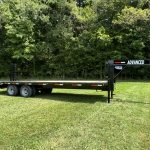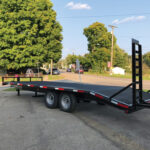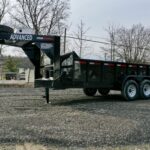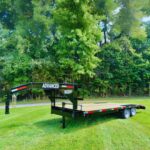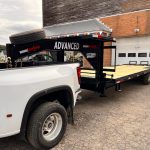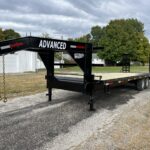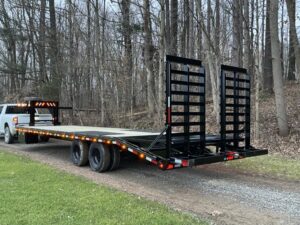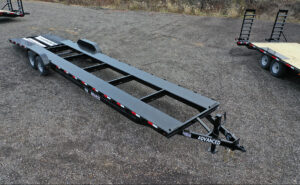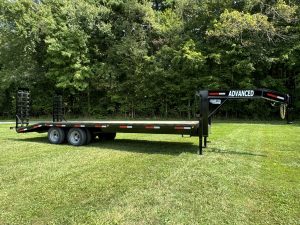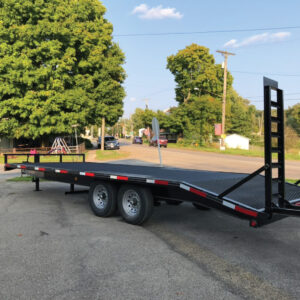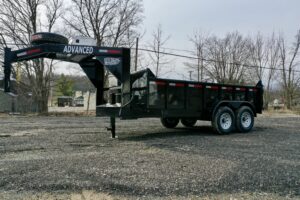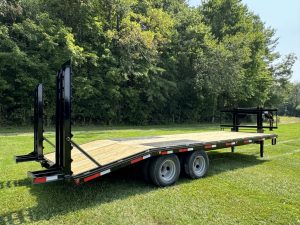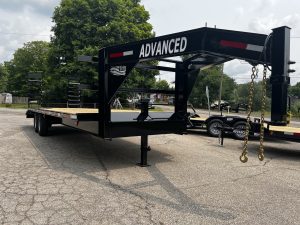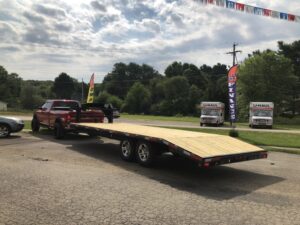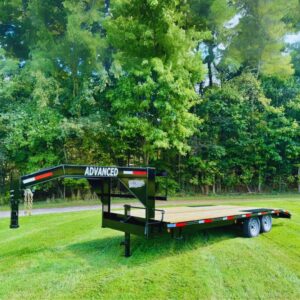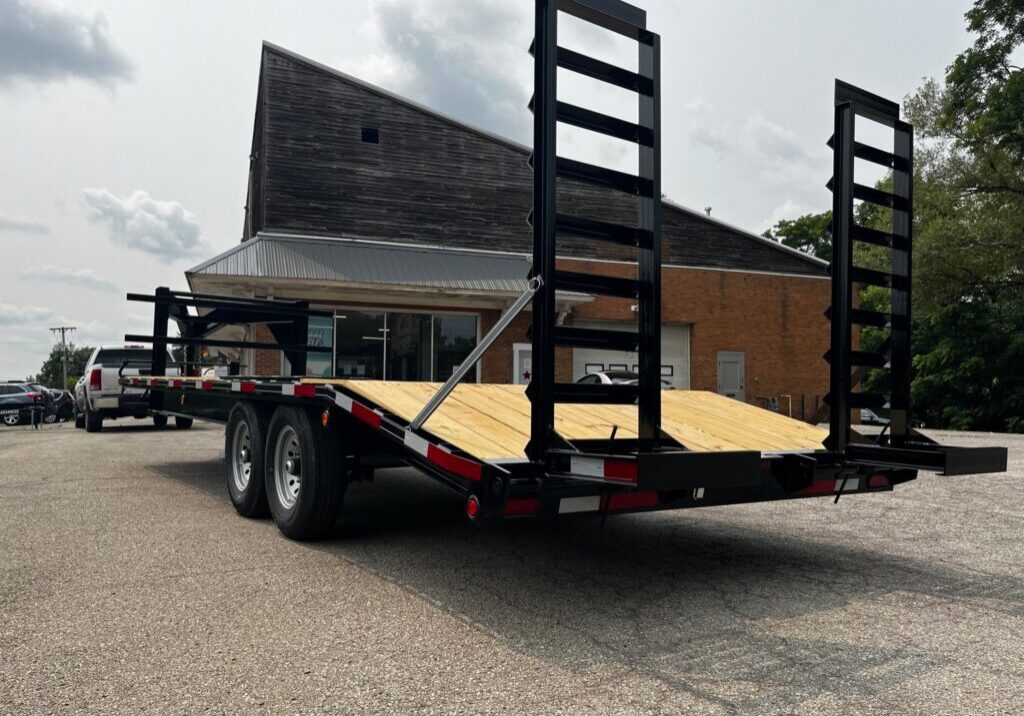
Flatbed Car Trailers for Sale: Professional Grade Solutions for Vehicle Transport
Finding the right flatbed car trailer means matching your specific hauling needs with proven engineering and reliable performance. Whether you’re transporting classic cars to shows, moving inventory between dealerships, or hauling heavy equipment across uneven terrain, the right trailer makes every job safer and more efficient.
Why Choose Flatbed Car Hauler Trailers
Flatbed car haulers offer unmatched versatility compared to enclosed alternatives. The open deck design allows loading from any angle, accommodating vehicles with non-standard dimensions or those requiring crane assistance. Professional transport companies rely on these trailers because they handle everything from low-profile sports cars to tall construction equipment without the height restrictions of enclosed units.
Key Advantages of Open Deck Design
Flexible Loading Options: Load vehicles from the side, rear, or even top using crane equipment. This flexibility proves invaluable when dealing with inoperable vehicles or tight loading spaces.
Superior Weight Distribution: Flatbed trailers distribute cargo weight more evenly across the deck, enabling transport of heavier loads while maintaining better stability on the road.
Quick Turnaround: Loading and unloading takes significantly less time than enclosed trailers, improving efficiency for commercial operators and reducing wait times at pickup locations.
Essential Features for Professional Car Transport
Heavy Duty Construction Elements
The foundation of reliable car hauling starts with reinforced frames engineered to handle concentrated weight loads. Professional-grade trailers feature:
- Reinforced steel construction that withstands repeated loading cycles
- Tandem axle configurations for improved weight distribution and better stability
- Heavy duty suspension systems designed for tough conditions and uneven terrain
- Integrated tie-down points strategically positioned for secure vehicle restraint
Deck Specifications That Matter
Trailer Length Considerations: Standard car hauler trailers range from 16 to 32 feet, with longer models accommodating multiple vehicles or oversized equipment. The right trailer length depends on your typical cargo and towing vehicle capacity.
Surface Treatments: Diamond plate decking provides superior traction during loading while resisting wear from tire contact and weather exposure. Some models feature removable fenders to maximize usable deck width.
Loading Ramps: Hydraulic or manual ramp systems enable smooth vehicle loading. Heavy duty ramps handle everything from passenger cars to light trucks without flexing or scraping.
Gooseneck vs. Bumper Pull: Choosing Your Hitch Type
Gooseneck Advantages
Gooseneck car haulers connect directly to the truck bed, offering several performance benefits:
- Higher weight capacity – typically 25,000+ lbs GVWR
- Better stability during highway travel and crosswinds
- Tighter turning radius for improved maneuverability
- Enhanced safety through superior weight distribution
Bumper Pull Benefits
Traditional bumper pull trailers work with standard receiver hitches and offer:
- Lower initial cost compared to gooseneck models
- Broader vehicle compatibility – no need for truck bed installation
- Easier storage in standard garage spaces
- Simpler maintenance with fewer specialized components
Weight Capacity and Load Ratings
Understanding weight specifications prevents overloading and ensures legal compliance. Key ratings include:
Gross Vehicle Weight Rating (GVWR): The maximum safe total weight including trailer and cargo. Common ratings range from 7,000 lbs for light-duty models to 25,000+ lbs for heavy duty trailers.
Payload Capacity: Actual cargo weight the trailer can carry after subtracting the trailer’s empty weight. This determines how many vehicles or how much equipment you can legally transport.
Axle Ratings: Individual axle weight limits that must not be exceeded even if total payload remains within limits. Tandem axles distribute weight more effectively than single axle designs.
Safety Features and Compliance
Braking Systems
Electric brakes are standard on trailers over 3,000 lbs, with hydraulic surge brakes available for specific applications. Heavy duty trailers feature:
- Electric brake controllers for precise stopping power adjustment
- Breakaway systems that activate trailer brakes if separation occurs
- Anti-lock capabilities on premium models for enhanced control
Lighting and Wiring
DOT-compliant lighting includes LED tail lights, turn signals, and side markers for maximum visibility. Quality wiring harnesses feature:
- Weather-resistant connections that prevent corrosion
- Integrated wiring protection routed away from road debris
- Standard 7-pin connectors compatible with most towing vehicles
Specialized Car Hauler Configurations
Multi-Car Haulers
Professional auto dealers and transport companies often choose multi-level car haulers that carry 4-8 vehicles per trip. These specialized trailers feature:
- Hydraulic deck systems for efficient loading
- Adjustable wheel chocks to accommodate different vehicle types
- Integrated winch systems for loading inoperable vehicles
Single Car Specialty Haulers
Classic car owners and racing enthusiasts prefer single-car trailers with premium features:
- Aluminum construction for reduced weight and corrosion resistance
- Enclosed storage compartments for tools and spare parts
- Removable fenders for maximum loading width
- Premium tie-down systems designed for valuable vehicles
Choosing the Right Manufacturer
Established Brands and Quality Indicators
Leading manufacturers like Big Tex Trailers have earned reputations through consistent quality and comprehensive warranties. When evaluating brands, consider:
Construction Quality: Look for continuous welding, properly finished surfaces, and quality hardware throughout the trailer.
Component Selection: Premium brands use name-brand axles, brakes, and suspension components rather than generic alternatives.
Dealer Network: Established manufacturers maintain extensive dealer networks for parts, service, and warranty support.
Customer Reviews: Real-world feedback from commercial operators provides insight into long-term durability and performance.
Professional Buying Considerations
New vs. Used Decision Factors
New Trailer Advantages:
- Full manufacturer warranty coverage
- Latest safety and efficiency features
- Customization options for specific applications
- Predictable service life and maintenance costs
Used Trailer Considerations:
- Significant cost savings on initial purchase
- Immediate availability vs. manufacturing wait times
- Proven performance history if properly maintained
- Potential for hidden wear or damage requiring inspection
Avoiding Dealer Mark Up
Working directly with manufacturers or authorized dealers often provides better pricing than secondary sellers. Professional buyers benefit from:
- Fleet pricing for multiple unit purchases
- Trade-in allowances for existing equipment
- Financing options with competitive rates
- Service packages including maintenance and parts
Loading and Transport Best Practices
Proper Load Securement
Professional car transport requires specific tie-down techniques:
Four-Point Restraint: Secure each vehicle with four tie-down straps minimum, positioned over suspension mounting points rather than body panels.
Chain vs. Strap Selection: Chains provide maximum strength for heavy equipment while straps with soft loops protect finished vehicle surfaces.
Load Distribution: Position heavier vehicles over axles and distribute weight evenly across the deck width.
Pre-Transport Inspection
Before each haul, inspect:
- Tire pressure and condition on both trailer and cargo
- Brake functionality and controller settings
- Light operation and electrical connections
- Hitch attachment and safety chains
- Load securement and weight distribution
Maintenance for Long-Term Performance
Routine Service Requirements
Regular maintenance extends trailer life and prevents roadside failures:
Monthly Checks:
- Tire pressure and tread wear patterns
- Bearing grease levels and wheel end play
- Brake adjustment and pad wear
- Light operation and wiring condition
Annual Service:
- Complete brake inspection and adjustment
- Bearing repack and seal replacement
- Structural inspection for cracks or fatigue
- Hydraulic system service (if equipped)
Component Replacement Planning
Quality trailers provide decades of service with proper maintenance. Budget for:
- Tire replacement every 50,000-100,000 miles depending on usage
- Brake components every 2-3 years for commercial applications
- Bearing and seal service annually for heavy-use trailers
- Deck resurfacing every 5-7 years for high-volume operators
Finding Your Perfect Fit
Matching Trailer to Application
The best combination of features depends on your specific hauling needs:
Occasional Use: Light-duty bumper pull trailers with manual features provide reliable service at reasonable cost.
Commercial Transport: Heavy duty gooseneck models with hydraulic features and premium components justify higher investment through improved efficiency and durability.
Specialty Applications: Custom configurations address unique requirements like oversized vehicles or specialized loading environments.
Working With Sales Teams
Professional sales teams help match equipment to applications rather than pushing highest-margin products. Quality dealers provide:
- Application analysis to determine optimal specifications
- Demo opportunities to test performance before purchase
- Training support for safe operation and maintenance
- Ongoing service throughout the trailer’s working life
Making Your Purchase Decision
Selecting the right flatbed car trailer requires balancing immediate needs with long-term value. Consider total cost of ownership including purchase price, financing costs, maintenance requirements, and resale value.
Professional operators benefit from establishing relationships with trusted suppliers who provide ongoing support beyond the initial sale. Whether you need a single trailer for personal use or a fleet for commercial operations, the right combination of features, quality construction, and dealer support ensures years of reliable service.
Contact our experienced sales team to explore our complete inventory of flatbed car haulers. We’ll help you find the perfect solution for your transport needs, backed by comprehensive warranties and professional service support that keeps you moving safely and efficiently.
EXPLORE MORE
RELATED ARTICLES
Top 5th Wheel Flatbed Trailer Models Available Today
Need a reliable 5th wheel flatbed trailer for heavy-duty hauling? This guide covers top models, key features, and what to consider when choosing the best trailer for your needs. Key Takeaways Discover Our Premium 5th Wheel Flatbed Trailers Advanced Trailer MFG takes pride in offering a range of high-quality flatbed…
Read More...20 ft Flatbed Trailers: Specs, Uses & Buying Tips
A 20 ft flatbed trailer delivers the right balance of hauling capacity and maneuverability for medium-duty transport needs. These versatile trailers feature an open deck design that accommodates oversized equipment, construction materials, and vehicles that won’t fit in enclosed trailers. Design and Construction The typical 20 ft flatbed trailer features…
Read More...Best Flat Bed Trailers for Sale | Top Deals to Enhance Your Hauling
Need a flatbed trailer for your hauling needs? This article will guide you through the types, features, and considerations for choosing the right trailers flat bed. Learn what to look for and make an informed choice. Key Takeaways Explore Our Range of Flatbed Trailers Our comprehensive selection of flatbed trailers…
Read More...Gooseneck or Bumper Pull: Which Trailer is Best for You?
Trying to choose between a gooseneck or bumper pull trailer? This article explains the differences and helps you decide which is best for your needs. Key Takeaways Understanding Trailer Types When it comes to towing, two primary trailer types dominate the market: bumper pull and gooseneck trailers. These two options…
Read More...Top Picks for Your Custom Built Trailer Needs
Looking for a trailer that fits your specific needs? A custom built trailer might be the answer. In this article, you’ll learn the benefits of custom trailers, explore various customization options, and discover different types available. See how a custom trailer can meet your needs perfectly. Key Takeaways Why Choose…
Read More...Flat Trailer Solutions Built For The Long Haul
A flat trailer offers a reliable way to transport large, heavy loads. This article covers what flat trailers are, their benefits, and available options to help you choose the best one for your needs. Key Takeaways High-Quality Flatbed Trailers for All Your Hauling Needs Built with reliable and durable parts,…
Read More...Gooseneck or Bumper Pull: Which Trailer is Best for You?
Trying to choose between a gooseneck or bumper pull trailer? This article explains the differences and helps you decide which is best for your needs. Key Takeaways Understanding Trailer Types When it comes to towing, two primary trailer types dominate the market: bumper pull and gooseneck trailers. These two options…
Read More...Top-Rated Gooseneck Flatbed Trailer Options for Your Hauling Needs
Top-Rated Gooseneck Flatbed Trailer Options for Your Hauling Needs A gooseneck flatbed trailer excels at heavy-duty hauling, offering superior stability by attaching to the truck bed. Ideal for transporting equipment or livestock, this guide covers top-rated options, key features, and tips for choosing the right model. Key Takeaways Gooseneck flatbed…
Read More...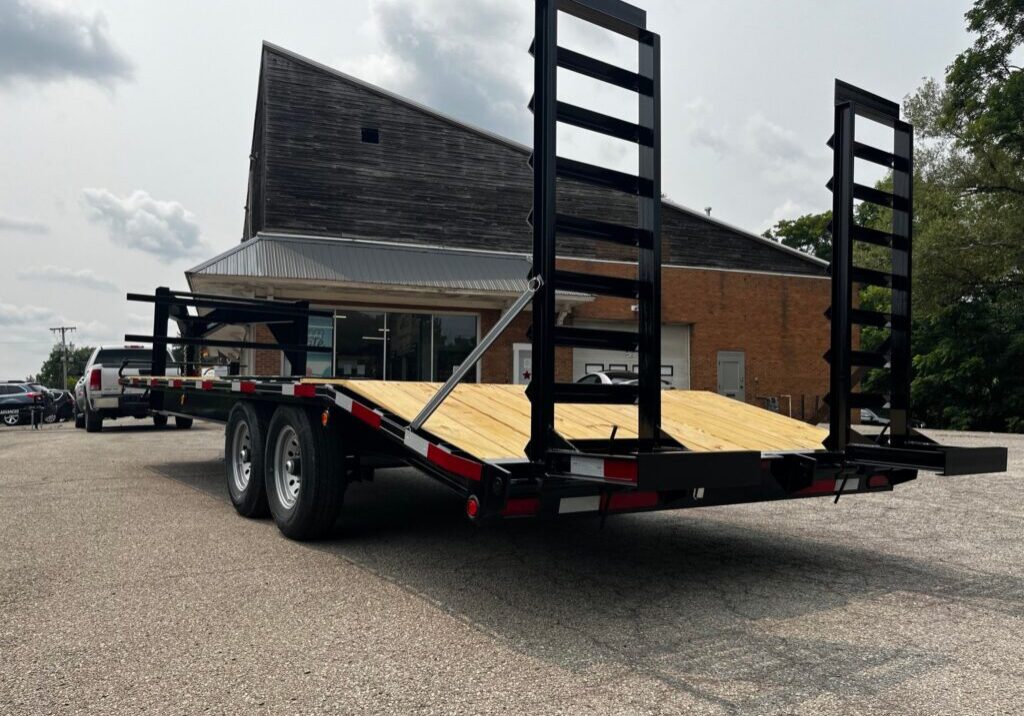
Flatbed Car Trailers for Sale: Professional Grade Solutions for Vehicle Transport
Finding the right flatbed car trailer means matching your specific hauling needs with proven engineering and reliable performance. Whether you’re transporting classic cars to shows, moving inventory between dealerships, or hauling heavy equipment across uneven terrain, the right trailer makes every job safer and more efficient.
Why Choose Flatbed Car Hauler Trailers
Flatbed car haulers offer unmatched versatility compared to enclosed alternatives. The open deck design allows loading from any angle, accommodating vehicles with non-standard dimensions or those requiring crane assistance. Professional transport companies rely on these trailers because they handle everything from low-profile sports cars to tall construction equipment without the height restrictions of enclosed units.
Key Advantages of Open Deck Design
Flexible Loading Options: Load vehicles from the side, rear, or even top using crane equipment. This flexibility proves invaluable when dealing with inoperable vehicles or tight loading spaces.
Superior Weight Distribution: Flatbed trailers distribute cargo weight more evenly across the deck, enabling transport of heavier loads while maintaining better stability on the road.
Quick Turnaround: Loading and unloading takes significantly less time than enclosed trailers, improving efficiency for commercial operators and reducing wait times at pickup locations.
Essential Features for Professional Car Transport
Heavy Duty Construction Elements
The foundation of reliable car hauling starts with reinforced frames engineered to handle concentrated weight loads. Professional-grade trailers feature:
- Reinforced steel construction that withstands repeated loading cycles
- Tandem axle configurations for improved weight distribution and better stability
- Heavy duty suspension systems designed for tough conditions and uneven terrain
- Integrated tie-down points strategically positioned for secure vehicle restraint
Deck Specifications That Matter
Trailer Length Considerations: Standard car hauler trailers range from 16 to 32 feet, with longer models accommodating multiple vehicles or oversized equipment. The right trailer length depends on your typical cargo and towing vehicle capacity.
Surface Treatments: Diamond plate decking provides superior traction during loading while resisting wear from tire contact and weather exposure. Some models feature removable fenders to maximize usable deck width.
Loading Ramps: Hydraulic or manual ramp systems enable smooth vehicle loading. Heavy duty ramps handle everything from passenger cars to light trucks without flexing or scraping.
Gooseneck vs. Bumper Pull: Choosing Your Hitch Type
Gooseneck Advantages
Gooseneck car haulers connect directly to the truck bed, offering several performance benefits:
- Higher weight capacity – typically 25,000+ lbs GVWR
- Better stability during highway travel and crosswinds
- Tighter turning radius for improved maneuverability
- Enhanced safety through superior weight distribution
Bumper Pull Benefits
Traditional bumper pull trailers work with standard receiver hitches and offer:
- Lower initial cost compared to gooseneck models
- Broader vehicle compatibility – no need for truck bed installation
- Easier storage in standard garage spaces
- Simpler maintenance with fewer specialized components
Weight Capacity and Load Ratings
Understanding weight specifications prevents overloading and ensures legal compliance. Key ratings include:
Gross Vehicle Weight Rating (GVWR): The maximum safe total weight including trailer and cargo. Common ratings range from 7,000 lbs for light-duty models to 25,000+ lbs for heavy duty trailers.
Payload Capacity: Actual cargo weight the trailer can carry after subtracting the trailer’s empty weight. This determines how many vehicles or how much equipment you can legally transport.
Axle Ratings: Individual axle weight limits that must not be exceeded even if total payload remains within limits. Tandem axles distribute weight more effectively than single axle designs.
Safety Features and Compliance
Braking Systems
Electric brakes are standard on trailers over 3,000 lbs, with hydraulic surge brakes available for specific applications. Heavy duty trailers feature:
- Electric brake controllers for precise stopping power adjustment
- Breakaway systems that activate trailer brakes if separation occurs
- Anti-lock capabilities on premium models for enhanced control
Lighting and Wiring
DOT-compliant lighting includes LED tail lights, turn signals, and side markers for maximum visibility. Quality wiring harnesses feature:
- Weather-resistant connections that prevent corrosion
- Integrated wiring protection routed away from road debris
- Standard 7-pin connectors compatible with most towing vehicles
Specialized Car Hauler Configurations
Multi-Car Haulers
Professional auto dealers and transport companies often choose multi-level car haulers that carry 4-8 vehicles per trip. These specialized trailers feature:
- Hydraulic deck systems for efficient loading
- Adjustable wheel chocks to accommodate different vehicle types
- Integrated winch systems for loading inoperable vehicles
Single Car Specialty Haulers
Classic car owners and racing enthusiasts prefer single-car trailers with premium features:
- Aluminum construction for reduced weight and corrosion resistance
- Enclosed storage compartments for tools and spare parts
- Removable fenders for maximum loading width
- Premium tie-down systems designed for valuable vehicles
Choosing the Right Manufacturer
Established Brands and Quality Indicators
Leading manufacturers like Big Tex Trailers have earned reputations through consistent quality and comprehensive warranties. When evaluating brands, consider:
Construction Quality: Look for continuous welding, properly finished surfaces, and quality hardware throughout the trailer.
Component Selection: Premium brands use name-brand axles, brakes, and suspension components rather than generic alternatives.
Dealer Network: Established manufacturers maintain extensive dealer networks for parts, service, and warranty support.
Customer Reviews: Real-world feedback from commercial operators provides insight into long-term durability and performance.
Professional Buying Considerations
New vs. Used Decision Factors
New Trailer Advantages:
- Full manufacturer warranty coverage
- Latest safety and efficiency features
- Customization options for specific applications
- Predictable service life and maintenance costs
Used Trailer Considerations:
- Significant cost savings on initial purchase
- Immediate availability vs. manufacturing wait times
- Proven performance history if properly maintained
- Potential for hidden wear or damage requiring inspection
Avoiding Dealer Mark Up
Working directly with manufacturers or authorized dealers often provides better pricing than secondary sellers. Professional buyers benefit from:
- Fleet pricing for multiple unit purchases
- Trade-in allowances for existing equipment
- Financing options with competitive rates
- Service packages including maintenance and parts
Loading and Transport Best Practices
Proper Load Securement
Professional car transport requires specific tie-down techniques:
Four-Point Restraint: Secure each vehicle with four tie-down straps minimum, positioned over suspension mounting points rather than body panels.
Chain vs. Strap Selection: Chains provide maximum strength for heavy equipment while straps with soft loops protect finished vehicle surfaces.
Load Distribution: Position heavier vehicles over axles and distribute weight evenly across the deck width.
Pre-Transport Inspection
Before each haul, inspect:
- Tire pressure and condition on both trailer and cargo
- Brake functionality and controller settings
- Light operation and electrical connections
- Hitch attachment and safety chains
- Load securement and weight distribution
Maintenance for Long-Term Performance
Routine Service Requirements
Regular maintenance extends trailer life and prevents roadside failures:
Monthly Checks:
- Tire pressure and tread wear patterns
- Bearing grease levels and wheel end play
- Brake adjustment and pad wear
- Light operation and wiring condition
Annual Service:
- Complete brake inspection and adjustment
- Bearing repack and seal replacement
- Structural inspection for cracks or fatigue
- Hydraulic system service (if equipped)
Component Replacement Planning
Quality trailers provide decades of service with proper maintenance. Budget for:
- Tire replacement every 50,000-100,000 miles depending on usage
- Brake components every 2-3 years for commercial applications
- Bearing and seal service annually for heavy-use trailers
- Deck resurfacing every 5-7 years for high-volume operators
Finding Your Perfect Fit
Matching Trailer to Application
The best combination of features depends on your specific hauling needs:
Occasional Use: Light-duty bumper pull trailers with manual features provide reliable service at reasonable cost.
Commercial Transport: Heavy duty gooseneck models with hydraulic features and premium components justify higher investment through improved efficiency and durability.
Specialty Applications: Custom configurations address unique requirements like oversized vehicles or specialized loading environments.
Working With Sales Teams
Professional sales teams help match equipment to applications rather than pushing highest-margin products. Quality dealers provide:
- Application analysis to determine optimal specifications
- Demo opportunities to test performance before purchase
- Training support for safe operation and maintenance
- Ongoing service throughout the trailer’s working life
Making Your Purchase Decision
Selecting the right flatbed car trailer requires balancing immediate needs with long-term value. Consider total cost of ownership including purchase price, financing costs, maintenance requirements, and resale value.
Professional operators benefit from establishing relationships with trusted suppliers who provide ongoing support beyond the initial sale. Whether you need a single trailer for personal use or a fleet for commercial operations, the right combination of features, quality construction, and dealer support ensures years of reliable service.
Contact our experienced sales team to explore our complete inventory of flatbed car haulers. We’ll help you find the perfect solution for your transport needs, backed by comprehensive warranties and professional service support that keeps you moving safely and efficiently.
EXPLORE MORE
RELATED ARTICLES
Top 5th Wheel Flatbed Trailer Models Available Today
Need a reliable 5th wheel flatbed trailer for heavy-duty hauling? This guide covers top models, key features, and what to consider when choosing the best trailer for your needs. Key Takeaways Discover Our Premium 5th Wheel Flatbed Trailers Advanced Trailer MFG takes pride in offering a range of high-quality flatbed…
Read More...Multiple Car Hauler Trailer: Complete Guide to Multi-Vehicle Transport Solutions
Expert Multiple Car Hauler Trailer Services and Solutions Transform your vehicle transport capabilities with professional car hauler trailers designed to haul multiple cars efficiently and safely. Get Your Multiple Car Hauler Quote Today! Why Multiple Car Hauler Trailers Are Essential for Your Business Multiple car hauler trailers maximize efficiency by…
Read More...20 ft Flatbed Trailers: Specs, Uses & Buying Tips
A 20 ft flatbed trailer delivers the right balance of hauling capacity and maneuverability for medium-duty transport needs. These versatile trailers feature an open deck design that accommodates oversized equipment, construction materials, and vehicles that won’t fit in enclosed trailers. Design and Construction The typical 20 ft flatbed trailer features…
Read More...Best Flat Bed Trailers for Sale | Top Deals to Enhance Your Hauling
Need a flatbed trailer for your hauling needs? This article will guide you through the types, features, and considerations for choosing the right trailers flat bed. Learn what to look for and make an informed choice. Key Takeaways Explore Our Range of Flatbed Trailers Our comprehensive selection of flatbed trailers…
Read More...Gooseneck or Bumper Pull: Which Trailer is Best for You?
Trying to choose between a gooseneck or bumper pull trailer? This article explains the differences and helps you decide which is best for your needs. Key Takeaways Understanding Trailer Types When it comes to towing, two primary trailer types dominate the market: bumper pull and gooseneck trailers. These two options…
Read More...Top Dual Tandem Trailer Options for Heavy-Duty Hauling
Searching for a trailer that can handle heavy-duty loads? Look no further than a dual tandem trailer. Known for their stability and durability, dual tandem trailers are built to manage the most demanding hauling tasks. In this article, we’ll cover what makes these trailers stand out, key features to look…
Read More...Top 10k Gooseneck Trailer Options for Heavy-Duty Hauling
Searching for the best 10k gooseneck trailer for heavy-duty hauling? This article covers top options, essential features, and what to consider when choosing the right trailer. Get ready to find out which models can handle your toughest tasks efficiently. Key Takeaways 10k Gooseneck Trailer Overview 10k gooseneck trailers are renowned…
Read More...Top Flat Deck Trailer Options | Best Deals & Features
Flat deck trailers are perfect for hauling oversized or heavy loads. They transport construction materials, vehicles, and other large items efficiently. This guide explores top flat deck trailer options, key features, and how to choose the right one for your needs. Key Takeaways Discover the Best Flat Deck Trailers Flatbed…
Read More...Top Picks for Your Custom Built Trailer Needs
Looking for a trailer that fits your specific needs? A custom built trailer might be the answer. In this article, you’ll learn the benefits of custom trailers, explore various customization options, and discover different types available. See how a custom trailer can meet your needs perfectly. Key Takeaways Why Choose…
Read More...Flat Trailer Solutions Built For The Long Haul
A flat trailer offers a reliable way to transport large, heavy loads. This article covers what flat trailers are, their benefits, and available options to help you choose the best one for your needs. Key Takeaways High-Quality Flatbed Trailers for All Your Hauling Needs Built with reliable and durable parts,…
Read More...

